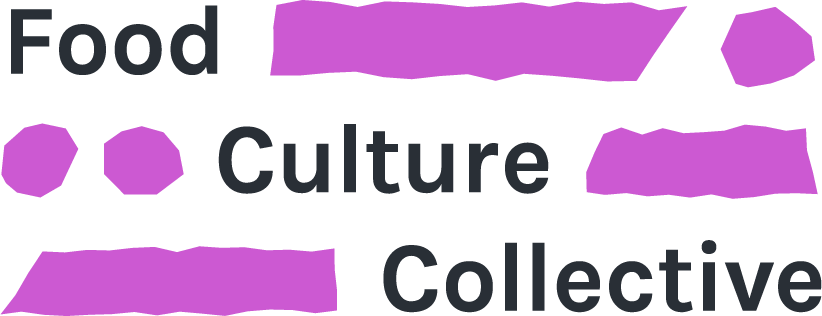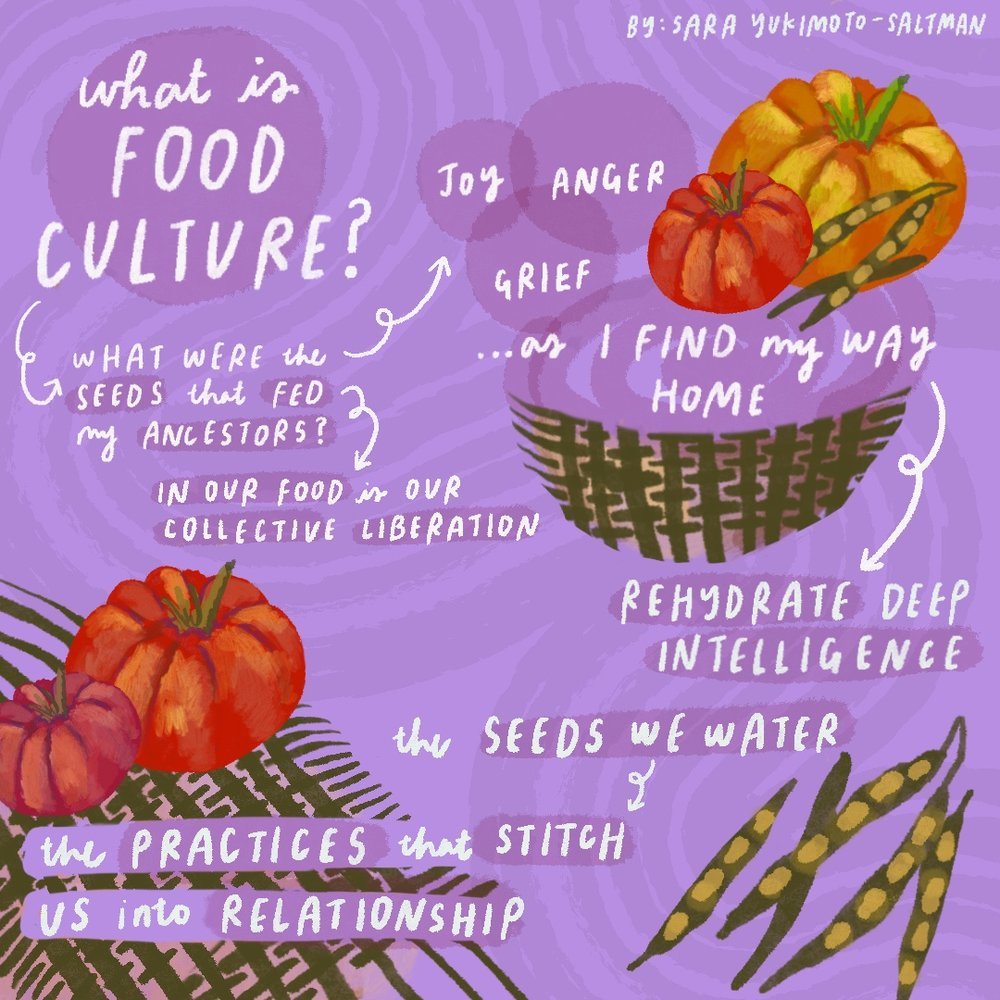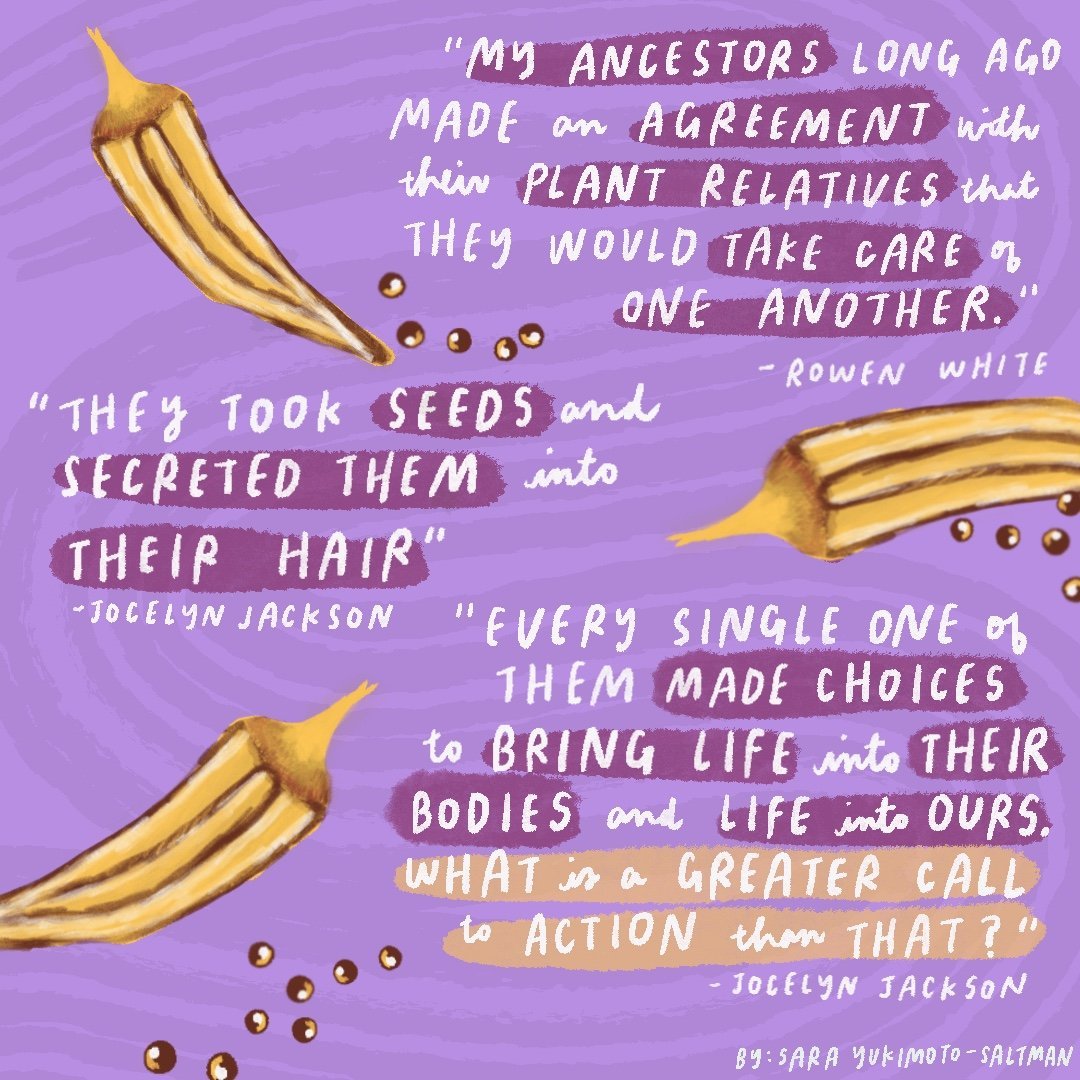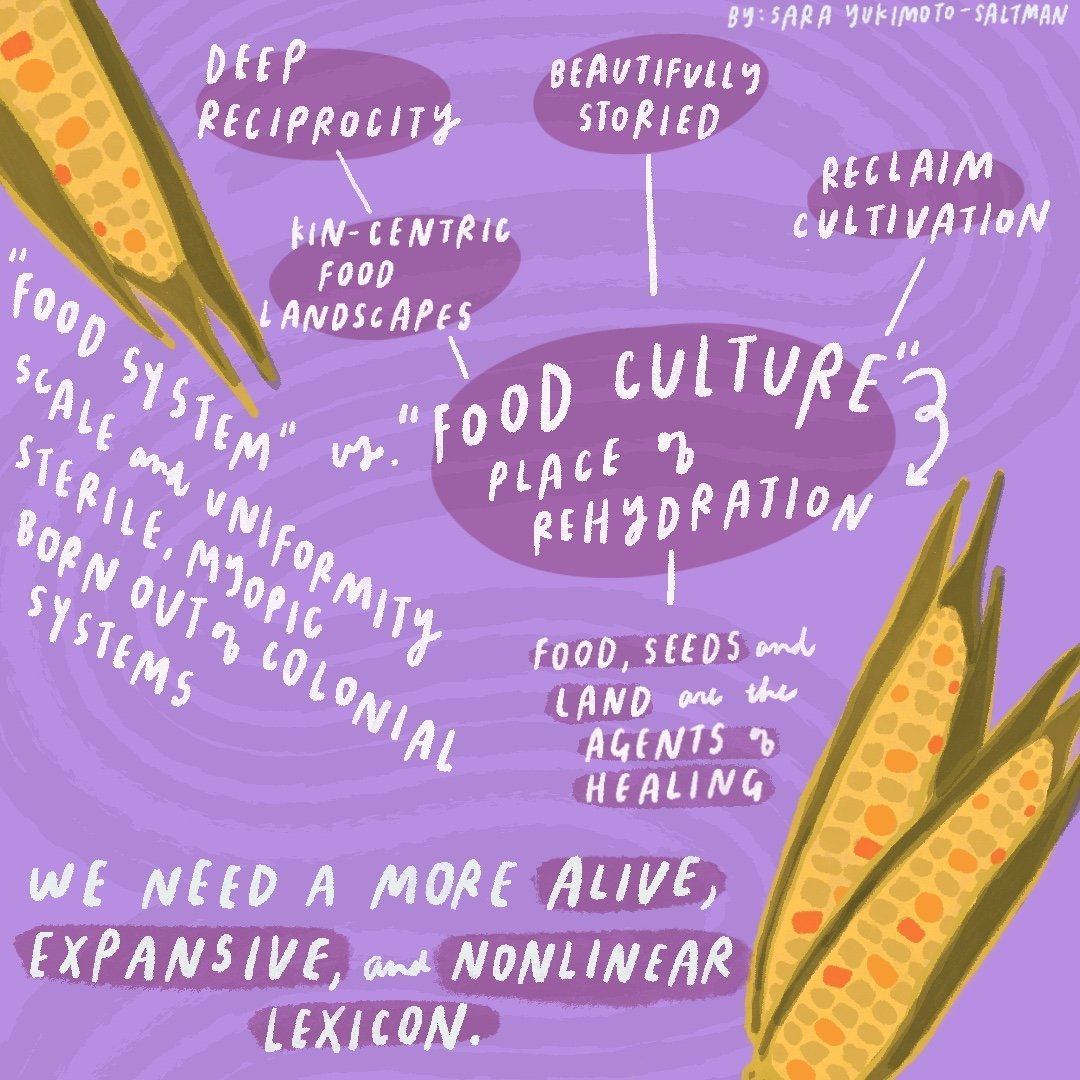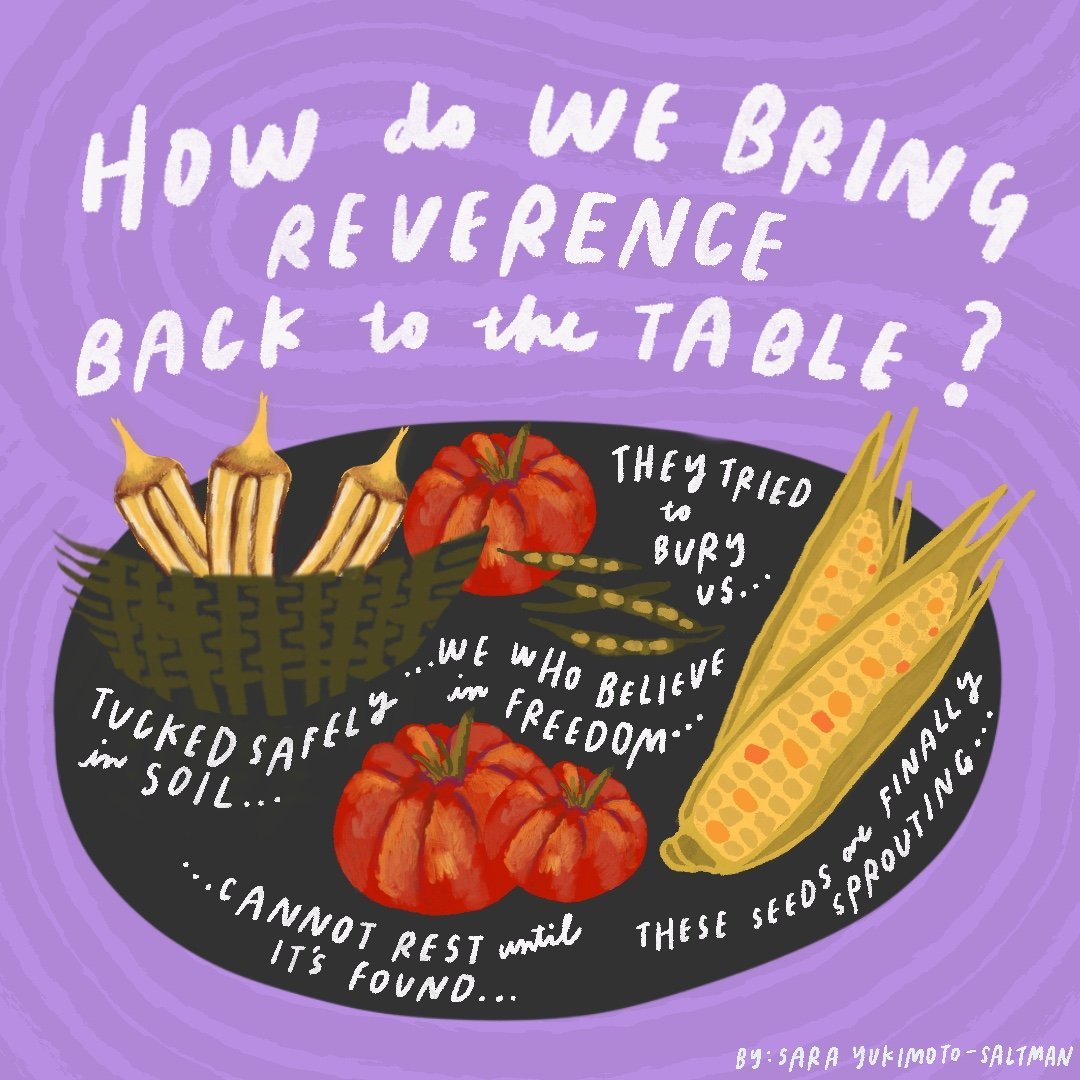How Do We Decolonize and Reimagine Food Culture?
Jocelyn Jackson and Rowen White in Conversation with Shizue Roche Adachi
BY ADA CUADRADO-MEDINA
Our Around The Table series features informal conversations between Food Culture Collective community members with thought leaders, elders, organizers, and friends. Together, we take a deep dive—sinking our teeth into the juicy stories, live questions, and critical conversations buzzing in the food and culture space.
This conversation occurred in 2021 when Food Culture Collective was known as Real Food Real Stories.
What is food culture? And, how do we reclaim and decolonize mainstream food culture to nourish a future rooted in care, healing, liberation and joy? These were the questions Real Food Real Stories Director of Communications and Narrative Design, Shizue Roche Adachi, brought to the table in a virtual conversation held in early November with Jocelyn Jackson and Rowen White, two celebrated food leaders, activists, and longtime veterans in the food culture space, .
Jocelyn, liberation cook-activist and co-founder of the People’s Kitchen Collective, and Rowen, a Mohawk Seed Keeper, storyteller, and farmer, joined over 100 virtual guests for an electrifying conversation that challenged the boundaries so often put on conversation of food and the “food system.” Together, they considered how transforming food culture can have impacts that go far beyond the food space—weaving a rich tapestry of threads and reflections on reciprocity and rehydrating seed culture, to police brutality and “death cults,” to the healing found in “storied” food cultures that nourish complexity and accountability.
What follows are some highlights and audio excerpts from this wide-ranging conversation, as well as some thought-weaving. You can read and listen through the whole piece, or pick and choose based on the questions you’re most drawn to. This was a rich hour-long conversation and we encourage you to tune in to the conversation in its entirety by watching the video embedded below.
Some quotes have been edited for length and clarity. To view the full, unedited transcript of our conversation with Jocelyn and Rowen, click here. All graphic recording illustrations by Sara Yukimo-Saltman.
Can you help us set the table?
Before diving into conversation, we like to kick off our virtual events by “setting the table” together. This practice offers us the opportunity to set some intentions about how we want to meet each other and what we’d like to bring into the space together. Especially as disembodied heads on Zoom, this practice encourages us to bring our hearts, bodies, and hungry bellies into this space with us.
Rowen and Jocelyn shared offerings of song and poetry to the community gathered around the virtual table, rooting us in joyful presence and collective co-creation.
What is food culture?
Rowen and Jocelyn both approach their work in food from a cultural orientation––it is bound up in ancestral pathways, the sharing of music and story, practices of kinship and embodied prayer. Their work reminds us how food culture can go beyond sustaining us to really nourishing us.
But starting a conversation about food culture can feel pretty overwhelming and expansive––where to start? So, we wanted to begin with the basics, with the question: what do we actually mean when we say,“food culture”?
We asked both Jocelyn and Rowen to share a little story of an experience, encounter, or portal moment in food culture that shaped who they are, their understanding of the world, or the work that they do.
Rowen: You know, I always say there's so many pathways to this dignified resurgence that we are participating in, and into this cultural rehydration that we're all partaking in…So many of us have our different ways of having those “aha” moments.
For me, it was sitting on a dusty farmhouse floor in New England on a farm when I was 17, and learning about heirloom seeds. And learning about not only did seeds like tomatoes come in all shapes and sizes and flavors and colors, but that they also had people who they were knitted together with, across landscapes and through migration and kinship routes. That there was this intimate dance, and co-evolution, that plants and humans had embarked together...
I have a very visceral sort of touchdown moment of sitting on this floor...just––mind blown––of the possibility. But then, at the same time, equal of my joy in that moment, was recognizing...I opened up a chasm of grief, and longing, and curiosity, and rage, and sadness, and all of the things.
...Knowing that, as a Mohawk woman, we have foods and seeds in our creation story, and in our seasonal ceremonial cycle, they play a central role. But I, myself, didn't have an intimate, reciprocal, embodied everyday relationship with them––as someone who was a more recent descendant of people who survived the boarding schools, and people who were severed from the land in ways that created imposed shame on who we were.
...I feel an unending amount of indebtedness and gratitude to those [seed] teachers who I apprenticed myself to, who are my plant relatives, who were generous and patient and kind with me, as I continue to rehydrate the seeds of memory that were inside of my body...
Jocelyn: When I think about some foundational moments of embracing food culture in my own journey, it was very much: Okay, instinct to do a study in art; instinct to study the law and justice; instinct for environmental education; instinct to travel, to do a heritage trip to West Africa... All these instincts collected, but there was a need for a golden thread of continuity between them, and, for me, that was food. Really powerful to, at a later age than childhood, learn things about some of the severing that happened during the Middle Passage.
One of the reclamation processes for me was––and I just had to run off screen to get this because it was so real in that moment––this okra pod. This okra pod includes the seeds of my ancestors, from generations ago to this present moment. Right? And the beauty of learning that, in this afro hair that's often cornrowed, there was an opportunity for my ancestors to braid these seeds; to braid rice, and to braid all these different seeds. To fulfill the instinct: I'm being ripped from my country, from my land, from my home–– what do I need to bring with me?
In this instant of clarity about that reality, they took seeds. They secreted it in their hair, in their crown. They brought it to this country, that was such a source of betrayal and pain, but they had the foresight to sow those seeds from home country. And to live into that tradition each time I have it [okra]
...My survival is writ large on this culture that we co-create around food, and I take personal responsibility for perpetuating that.
How do we all play a role in shaping our shared food culture?
In sharing their own “aha” moments, Rowen and Jocelyn were also quick to invite us all in the work and pleasures of cultural “rehydration” and reclamation. Home and lineage, they tell us, can be found by following the threads of what nourishes us. And by nurturing a deeper relationship with food, which recognizes food as teacher not just as “fuel,” we can weave ourselves back into the fabric of reciprocity and belonging.
Rowen: Whether it's seeds, or food, or in the kitchen, or art, or poetry, or whatever is your passion: you had ancestors that did that too. You had ancestors that had great imbued meaning of those beautiful lifeways. Whatever it is that your passion is, it's the way that you stitch yourself back into that culture. And we need all of us, right?
I'm just really grateful that foods and seeds were the lens through which I am continuing to find my way home. And, this is a practice that we all can engage in, because we all eat! We all eat every day! And those foods go inside our body and they rehydrate all of this deep, deep intelligences inside of our body. That's the intimate part of it...it was the everyday ceremonies: every day, we make breakfast; every day we make lunch and dinner. And so, what are the ways in which I can continue to renew those original agreements that my ancestors made a long time ago, in those small everyday ways?
So, that's the invitation to you all, is that we all have that possibility, to continue to tend to that...
Jocelyn: In this approach to food being sacred, there being a real important opportunity for us, with every meal, to embrace what I characterize as the cultural, ecological, and spiritual connection that can be a part of each food experience. And in that is our collective liberation.
Jocelyn also shared how rekindling a sacred relationship to food may be difficult and uncomfortable, but ultimately opens us up to a much richer understanding:
Jocelyn: There is a necessity for us to know that we are inherently nature. The process of us deconstructing the consumptive pathways is for us to get a little bit uncomfortable. And, even a lot uncomfortable. I don't want to back up from that: we're going to be uncomfortable. We're going to have to lead harder lives. That difficulty, and that discomfort, is a direct pathway to more joy, and more life. It is not a bad thing!
How has mainstream food culture’s focus on consumption shaped our culture at large
From commodity supply chains to the farm-to-table movement, charting the linear path of consumption is how we’re often explicitly and implicitly taught to relate to food. We recognize that the wealth and history of the United States is rooted in chattel slavery and settler colonialism, and bound up in the practices of extraction and exploitation. So we asked Jocelyn and Rowen how we might fundamentally shift the values at the center of our shared food culture, and how that might have ripple effects beyond the “food space.”
If we want to de-center consumption, what should be at the center instead? What would reclaiming and decolonizing mainstream food culture make possible and actually look like in practice?
Jocelyn: What really immediately comes to mind is this project that People's Kitchen Collective was able to do in 2018. We re-characterized that consumptive thread as: from the farm to the kitchen, to the table, to the streets. And that was an opportunity for us to, one: reclaim spaces where Black and brown lived experiences were often invisibilized within the consumption stream, right? That huge piece of labor, and sacred storytelling, and those food traditions, are often left out of that continuum.
Reclaiming that is such a huge part of acknowledging: we are part of a system that is flawed and, ultimately, in the pursuit of harm and not health. It's in the pursuit of persecution and oppression, as opposed to uplift-ment and life giving qualities. When I think about that, the transition, for me it's going from consumption and reclaiming cultivation.
...It really is imperative for us to become the cultivators once again… That spirit, that comes along with that process, is what will disentangle us from this consumptive presumption that is a lie. It is an absolute lie.
Building off of Jocelyn’s threads of cultivation, Rowen reminds us that a focus on consumption comes from a culture of entitlement:
Rowen: ...The thing that came to mind was reciprocity; understanding that just as much as we receive the gift of food from the land, and from all the ways in which nourishment comes to our table, and into our homes, and to our hearts. Recognizing that, as an Indigenous woman, I reside inside a violent dominant culture that is an entitlement culture; that is a culture that feels as though they are entitled to take whatever they can, and there’s a very anthropocentric thinking, that we are the only ones who received that nourishment, and there's not that continuum of nourishment that goes around.
...I've been a part of this [food] movement for 25 years, and even in the last two decades, we're starting to see the growth of this Indigenous (Indigenous from all over the globe) mindset of the values of reciprocity. Understanding that we're not just entitled to receive all the “spoils of war” and the spoils of consumption; that we do have a responsibility to engage in reciprocity in order to make that be a reality.
And we're not the only recipients of that, right? There's a whole web of kinship, seen and unseen, that are also forgotten in this chain of consumption….That's the kind of scaling up that we need to do: creating that culture of care inside of our food landscapes; to make that be possible, that it's not just humans who are the beneficiaries of the way in which food makes it to our table.
Rowen also reminded us how essential the collective practices of storytelling and cultural work are to this transformation, and touched on the ways we all make and shape culture in our kitchens, gardens, and around our tables:
Rowen: That's why storytelling and cultural workers are so vital in this movement, is because we are actually having to reimagine and create more nourishing conditions to grow the next generation of people who see themselves no different from the land, who see themselves as woven into that. And that is deep, long game cultural work. So I often say: what is my work, what is my purpose? My purpose is to help grow the next generation of people who love seeds as mother, or as nourisher, or land as his family, as kin.
“Food culture” or “food system”? How can we decolonize the language of food?
What does having a conversation about food culture, instead of about the “food system,” affirm or make possible? Culture creates the parameters for systems to emerge; culture offers us a framework for what is “logical” and defines shared, foundational values. And yet, we have inherited an inclination to focus more on the “system” than the culture that created it, which can mean we focus our efforts on fixing systems that are inherently broken.
In the food space, the last few decades have been dominated by the language of the “food system.”
For food cultural workers like Jocelyn and Rowen, this can sometimes mean the complexity and full impact of their work is simplified by others in order to make it intelligible within the parameters of what doing “food work” is supposed to be. Which begs the question, has the lexicon of the “food system” limited the conversation?
Rowen: People will always, when they make my bio, or introduce me, or whatever, they’ll always say, She does food systems work. And I'm like, I don't do food systems work! I do something way more expansive than that. And I think all of us do. I think we all do something way more expansive than that. I think it's important that we push back on the way in which colonial culture tries to make what we do smaller, or fit it into their paradigm, or their understanding of what it is.
I think the call to action in this time, is that we need a more alive, expansive, dynamic, nonlinear lexicon to help us seed what is possible into the future. I can't stand the phrase food system because it feels sterile, reductionist, and hollow. And that it was birthed out of the same forces that created the destruction of the beautifully storied cultures that we all descend from. I think about Indigenous languages from all over the world, and the way in which there are words that encapsulate so much more richness, and depth, and dimension.
...I think the invitation, or the call to action for all of you who are listening, is how can we stretch our imaginations and our creative vision, to come up with a new lexicon to how we speak to this work?
The systems approach to food was, at least in part, rooted in a desire to make scale comprehensible. But Jocelyn makes the compelling argument that by trying to create a model that helped us to wrap our heads around the immense impact of our scale of production, manufacturing, and consumption, we have allowed ourselves to become disassociated from it. How do we scale our language, Jocelyn asks us, without reinforcing a sterile, uniform, and reductive relationship to food?
Jocelyn: When I think about this idea of food system and food culture, I also immediately identify that we are being very much in this place of––what's the word I want to use? It's almost, like, a myopic approach. If we are shuttled into a very specific way of dealing with food in our lives that is in a scaled proportion of humanity, as opposed to the story that is real for our own bodies and our own families, then that is a betrayal of that connection, and that relationship.
When we're able to really go deeply into this difference between system and culture, we can see more of the truth––that there's a great deal of brainwashing that happened over the last millennia when it comes to separating people from food. And, there's great admiration for the success of systems that can formalize a uniformity. That uniformity is also a lie! Only in the diversity can we get to the truth of what our food culture is!
...I pronounce it in a dramatic way because it's necessary: the food systems that we're speaking of are death cults. They are refinements. They are, again, this idea of scale and of uniformity. Fundamentally, that causes death. It needs to be cast away in a really fundamental way that is both a marathon and sprint kind of approach. Because we are signed up for it in so many ways in our lives. So divest! Just divest and really get back to that moment of being in right relationship.
How can our shared food culture feed accountability?
The siloing of the food conversation can reflect the assumption that we can treat our relationship to food as if it isn't inherently tied to our relationship to everything.
In 2021, Jocelyn created an interactive 3D tablescape, called Fixed Price Menu, in partnership with Array and LEAP (Law Enforcement Accountability Project). The art piece shows us a table set for Philando Castille and Jeronimo Yanez, the police officer who murdered him. And in the description of the piece the audience is asked, what culture did Jeronimo feed on that would allow him to take life so swiftly?
We asked Jocelyn what she might say to someone who says food has nothing to do with this story of police violence. How would she connect those dots?
Jocelyn: I take food so personally, that I can find meaning in it in every single direction. And for this group, the Law Enforcement Accountability Project, to recognize that food as an art form is a way to reflect this story that happened, feels so important! And felt like something I was training for for over a decade. Because, the day after I got this assignment, Philando’s mother, through Bon Appetit, shared the story of Philando’s favorite foods and the things that she fed her son, the things that she gave him to honor his life. And those foods made it onto this table. But at the place setting of Officer Yanez, not Philando’s.
I want to make clear that we make a choice on what we feed. Right?
...For me, it's incredible to create a conceptual menu that tells this story in such a way that people can relate to it: They can actually cook these recipes, and reflect on this story, and take responsibility for being a part of the accountability process. Because that's ultimately what's going on every time we eat a meal. We're talking about a liberation moment, we're talking about a cultural moment. We're talking about a sacred moment. Can that be imbued with the process of accountability, for ourselves, for our neighbors and family, for the folks in our lives that we find the most challenging and questionable? It's all possible, in that dynamic.
How can we bring reverence back to the table? How can we reseed our imaginations for the future?
Rowen wrapped up the conversation with a reflection on what it looks like, for all of us, to do the cultural work or reclaiming and enriching food culture. The goal, she reminds us, is not to “revert” to a past relationship, but to reseed an expansive imagination of the world we can share. Reclaiming our shared food culture, then, becomes a practice of teaching ourselves how to hold complexity and talk about cultural transformation on a broader scale.
Rowen: A few things: How do we also honor the fact that so many things that come to our plate, to nourish us, or the various other beings who are also nourished along the way, also gave their life so that we could have life. So how are we bringing reverence back to the table? And, how are we growing, each and every one of us... I always talk about reseeding imaginations of what's possible; that's the way I like to speak about culture work.
I think we need to recognize that raising that next generation of people who can hold complexity––who don't want to simplify into black or white, or the trap of the binary that we consistently fall into. That is the work we're doing right now.
...The time is now! As we continue to rehydrate the seed culture, and food culture, and recognize that it's not static. It's not something that we're going back to, right? We are bringing that ancestral brilliance with us, but we also have to recognize: it's something never before seen that we are moving towards.
So, to what end? Why reclaim, reimagine, and decolonize mainstream food culture? There is a quote by the Black queer cultural worker and organizer Cara Page: “Our movements themselves need to be healing or there's, or there's no point in them.” So, how do we ensure that the “food movement” is focused on the deep cultural work of reconciliation, repair, and healing? Braiding together many threads of the conversation, Rowen reminds us that by embracing the complexity and richness of a decolonized food culture we can begin to truly nourish a culture of care.
Rowen: So many of us are bringing forth new ceremonies that enable us to continue to bring this reverence, and this respect, and this love, and this heart, back into the work. Because I know a lot of people––myself included as a young person––there's a lot of despair. There's not a single one of us who is untouched from that grief of disconnection and living in diaspora. Even as somebody who is on Turtle Island, the land of my ancestors, I still live in a cultural diaspora, because of the violence of colonization.
So, what are the ways in which we are recognizing that we are all traumatized by this system of dominance and violence. How are we increasing our capacity to hold complexity, to have compassion, and to imagine that healing is possible.
...And so that's always the invitation here, is: how are we continuing to recognize that this work we're doing in food culture is ultimately healing work. And those foods, and seeds, and the land, are the agents of healing.
There are so many more juicy bits to pull out from this jam-packed conversation, and so many threads to tease out further. To watch the full Around The Table conversation, tune in to the video embedded at the start of the post. You can also find the full transcript here.
Abundant gratitude to Jocelyn and Rowen for the offerings of their time, wisdom, rehydration, and seeds for action. To keep up with their work, be sure to follow them on social media at @rowenwhite and @justuskitchen. And be sure to subscribe to the RFRS newsletter to get first dibs on free tickets to our next Around The Table.
Have a juicy question or topic you’d love to see us tackle? Or have a suggestion for a roundtable guest you’d love us to invite? Feel free to reach out. And to learn more about Food Culture Collective’s mission to democratize food culture to feed our collective healing and transformation, click here.
